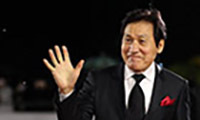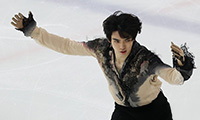Old Masters Of Cinema Who Never Slow Down

The director Manoel de Oliveira turned 100 last year.
By A.O. SCOTT
The Late Film, a series at the BAMcinematek in Brooklyn from late April through much of May, explores movies with contradictory energies: the work of accomplished artists past their prime and full of promise. And there is something wonderfully perverse, if most likely accidental, about devoting May, symbolic of freshness and youth, to old masters in the winter of their creative lives.
The series at the Brooklyn Academy of Music is unusual, even radical in the way it brings together disparate materials. Most film series are organized around a single genre or period, a national cinema or, most conventionally, a single director’s oeuvre. BAMcinematek and the program’s co-curator, Miriam Bale, have wrenched two dozen films out of those familiar contexts, bringing together a startlingly diverse array of films and filmmakers, from Yasujiro Ozu to Jean-Luc Godard, from Ernst Lubitsch to Robert Altman, from John Ford and Howard Hawks to Stanley Kubrick and Ousmane Sembene.
And rather than dwelling on established touchstones or acknowledged masterpieces, the series assembles an intriguing collage of movies that are, in their different ways, provocative and surprising, capable of challenging our assumptions about their individual makers and even about motion pictures in general.
Cinema, after all, is still a comparatively young art form, one that thrives on novelty, youth and timeliness. But the old-timers keep going, none more doggedly than Manoel de Oliveira, the Portuguese director (“Abraham’s Valley”) who celebrated his 100th birthday last year and who is represented in the series by“A Talking Picture,”from 2003. This picture has a lot to say. Most of it consists of deceptively casual dialogue conducted in a half-dozen languages. A history professor and her daughter are traveling by boat from their home in Lisbon to India, stopping at Mediterranean ports and chatting with people they meet about the history that surrounds them.
The immediacy of the movie seems at odds with its deliberate pacing and classical style, so that it strikes you as both uncannily old fashioned and weirdly urgent. And this feeling of anachronism, of encountering something at once old and new and therefore hard to place, may be the defining feature of the late film.
Many filmmakers, writers and artists are blessed with longevity, but not all of them arrive at true lateness, that stage where calm mastery collides with a restless sense of unfinished business, where the contemplation of mortality inspires both resignation and revolt.
Late work is both familiar and strange, characteristic of the artist and yet markedly at odds with everything that preceded it. A catalog of canonical late works might include Monet’s water lilies, Matisse’s paper cutouts and collages, Ibsen’s final plays, and Beethoven’s Ninth Symphony and last six string quartets. Beethoven in particular looms large in Edward W. Said’s“On Late Style,”one of the few sustained critical studies of the phenomenon of lateness. For Said, a prolific critic and polemicist writing not long before his own death in 2003, the music of Beethoven’s last period displays not a collected, mature acceptance of fate but rather a“nonharmonious, nonserene tension.”
The term that attaches itself most frequently to such work, in Said’s account, is untimeliness. We have a habit of sorting culture into periods, and of plotting the careers of individual artists along an arc of development.
But poets and composers are not trees, and sometimes where we expect dead wood, we find strange new growth.
Much of the pleasure of the Late Film series resides in the coincidences it uncovers in its pursuit of the untimely. But the series also seems curiously timely, or even prescient, since we find ourselves, right now, on the verge of a heroic age of late film.
Woody Allen and Clint Eastwood, both well into their 70s, show no signs of slowing down.
In France, meanwhile, the lions of the New Wave - from Godard to Agnes Varda, from Jacques Rivette to Eric Rohmer, all represented at BAMcinematek - seem to gain vigor and ferocity with each passing decade. And the erstwhile movie brats of the New Hollywood - upstarts like Martin Scorsese, Steven Spielberg and Francis Ford Coppola - are at the age when people in other professions start contemplating retirement. What kind of filmmakers will they turn out to be? It may be too early to say.
스마터리빙
more [ 건강]
[ 건강]이제 혈관 건강도 챙기자!
[현대해운]우리 눈에 보이지 않기 때문에 혈관 건강을 챙기는 것은 결코 쉽지 않은데요. 여러분은 혈관 건강을 유지하기 위해 어떤 노력을 하시나요?
 [ 건강]
[ 건강]내 몸이 건강해지는 과일궁합
 [ 라이프]
[ 라이프]벌레야 물럿거라! 천연 해충제 만들기
 [ 건강]
[ 건강]혈압 낮추는데 좋은 식품
[현대해운]혈관 건강은 주로 노화가 진행되면서 지켜야 할 문제라고 인식되어 왔습니다. 최근 생활 패턴과 식생활의 변화로 혈관의 노화 진행이 빨라지고
사람·사람들
more많이 본 기사
- 세계 곳곳서 ‘美규탄’ 시위…마두로 아들 “거리로 나와달라”
- 코미디부터 예술영화까지… ‘천의 얼굴’로 스크린 누빈 안성기
- ‘국민 배우’ 안성기 별세…69년 연기 인생 마침표
- 美 ‘유령 특수부대’ 델타포스
- 베네수엘라, 세계 최대 매장량이라는데…국제유가도 영향받나
- 트럼프 “우리가 베네수 맡고 있다…선거前 국가재건이 먼저”
- 美, 베네수 부통령에 압박 “마두로와 다른 선택하길”
- [美 마두로 축출] 트럼프 말대로 베네수 석유 증산할까…전문가 ‘글쎄’
- [美 마두로 축출] 마두로 베네수엘라 대통령, 5일 법정 첫 출석
- ‘길잃은’ 中 중남미정책…일대일로에 직격탄
- 이부진 호텔신라 사장 NBA 중계화면에…아들과 함께 미국서 휴가
- 故김영인 누구?..故송도순 이어 별세, 슬픔에 빠진 방송계
- [CES 2026] “CES는 미중 긴장완화 ‘가교’…스위스 같은 중립지대 지향”
- [CES 2026] 6억달러 새단장한 우아한 전시장…내부엔 지게차 동원 개막준비
- 젤렌스키 “이달 내로 종전안 놓고 美 정상회의 희망”
- 여야 새해도 극한대치… ‘종합·통일교특검’ 법사위 첫 戰場 예고
- 아이유♥변우석·지성·신하균·유연석.. ‘2026 MBC 연기대상’ 벌써 치열하다
- 美, 직접통치아닌 압박통한 정책개입 가닥… “함포외교”
- [美 마두로 축출] 뉴욕 구치소 수감된 마두로… “좋은 밤이에요” 인사도
- [美 마두로 축출] 미 곳곳서 반전시… 1
- 20kg 빼고 아이돌 외모 되찾더니..강남, 기안84와 북극 마라톤 도전
- [美 마두로 축출] 트럼프 ‘서반구 패권’ 구상 본격화하나…중남미 긴장 고조
- [美 마두로 축출] 트럼프, 두번째 중대 군사작전…北이 받을 메시지는
- 임재범, 은퇴 발표 “박수칠 때 떠나겠다”
- [CES 2026] 우유 꺼내고 수건 개는 로봇…LG ‘가사 해방’ 속도
- 李대통령 “中, 한반도 평화 파트너…… 2
- 美 경제석학 “韓 원화가치 매우 저평가…향후 회복할 것”
- ‘연프 중독’ 고준희, 눈 성형 고백에 풍자 “과연 눈만 했을까?” 의심
- [美 마두로 축출] 갈라진 지구촌…쏟… 1
- 국힘에 ‘살려달라’고 문자 메시지?…이혜훈측 “전혀 사실 아냐”
- 영종도 인천공항 잇는 3번째 다리 내일 개통…요금 2천원
- [美 마두로 축출] 서반구·마약·석유…트럼프 작전배경의 세 키워드
- [美 마두로 축출] 체포된 마두로 부부, 뉴욕 도착…다음주 재판받을 전망
- [美 마두로 축출] 한밤 안가 급습 ‘확고한 결의’ 작전… “침실서 끌어내”
- BBC “입소문서 시작한 K-뷰티, 전세계 스킨케어 루틴으로”
- [美 마두로 축출] 트럼프 “베네수엘라 부통령이 잘하면 미군 주둔 안해”
- 李대통령, 오늘 국빈 방중 출국…비핵화·한한령 ‘돌파구’ 주목
- [美 마두로 축출] 유엔 안보리, 5일 긴급회의…베네수 소집요청
- 김병기 배우자 법인카드 의혹, 동작구… 2
- ‘왕따 주행 논란’ 억울함 푼 김보름 “말로 담기 어려운 시간 지나...” 현역 은퇴 선언
- [美 베네수 공격] 버스기사 출신 독재자… ‘차비스모’ 마두로의 몰락
- [美 마두로 축출] 트럼프 “베네수엘라 부통령이 잘하면 미군 주둔 안해”
- “韓 독립혼 상징”…재조명되는 현대차그룹 상하이 임정 보존활동
- 美, 마두로 전격 체포·압송…트럼프 “정권이양까지 베네수 통치”
- ‘에릭♥’ 나혜미, 두 아들과 일상 공개..짱구 볼살+붕어빵 눈매 “우리 강아지들”
- 트럼프 “안전한 정권이양 때까지 미국이 베네수엘라 통치”(종합)
- [美 베네수 공격] 본디 법무장관 “마두로 부부, 미국서 전면적 처벌받을것”
- 美, 베네수 전격공격 마두로 축출…트럼프 “공격성공, 체포”
- 현대차·기아·제네시스… 2025년 판매 역대 최다
- “황희찬 시즌 최고의 퍼포먼스” 극찬, 웨스트햄전 1골·1도움 폭발... 울버햄프턴 ‘EPL 20경기 만에 감격 첫 승’
1/5지식톡

-
 미 육군 사관학교 West Poin…
0
미 육군 사관학교 West Poin…
0https://youtu.be/SxD8cEhNV6Q연락처:wpkapca@gmail.comJohn Choi: 714-716-6414West Point 합격증을 받으셨나요?미 육군사관학교 West Point 학부모 모…
-
 ☝️해외에서도 가능한 한국어 선생님…
0
☝️해외에서도 가능한 한국어 선생님…
0이 영상 하나면 충분합니다!♥️상담신청문의♥️☝️ 문의 폭주로 '선착순 상담'만 진행합니다.☎️ : 02-6213-9094✨카카오톡ID : @GOODEDU77 (@골뱅이 꼭 붙여주셔야합니다…
-
 테슬라 자동차 시트커버 장착
0
테슬라 자동차 시트커버 장착
0테슬라 시트커버, 사놓고 아직 못 씌우셨죠?장착이 생각보다 쉽지 않습니다.20년 경력 전문가에게 맡기세요 — 깔끔하고 딱 맞게 장착해드립니다!장착비용:앞좌석: $40뒷좌석: $60앞·뒷좌석 …
-
 식당용 부탄가스
0
식당용 부탄가스
0식당용 부탄가스 홀세일 합니다 로스앤젤레스 다운타운 픽업 가능 안녕 하세요?강아지 & 고양이 모든 애완동물 / 반려동물 식품 & 모든 애완동물/반려동물 관련 제품들 전문적으로 홀세일/취급하는 회사 입니다 100% …
-
 ACSL 국제 컴퓨터 과학 대회, …
0
ACSL 국제 컴퓨터 과학 대회, …
0웹사이트 : www.eduspot.co.kr 카카오톡 상담하기 : https://pf.kakao.com/_BEQWxb블로그 : https://blog.naver.com/eduspotmain안녕하세요, 에듀스팟입니다…
케이타운 1번가
오피니언
 손영아 문화 칼럼니스트 / YASMA7 대표
손영아 문화 칼럼니스트 / YASMA7 대표 [손영아의 문화산책] ‘슈만의 연가’… 170년 전 멈춘 시간, 끝나지 않은 사랑
 김재천 서강대 국제대학원 교수
김재천 서강대 국제대학원 교수 [김재천 칼럼] 2026년, 미·중 대타협은 가능할까
 조지 F·윌 워싱턴포스트 칼럼니스트
조지 F·윌 워싱턴포스트 칼럼니스트 [조지 F. 윌 칼럼] AI 투자 붐이 걱정된다면?… 역사적 맥락을 보라
 이희숙 시인·수필가
이희숙 시인·수필가 [금요단상] 차가운 길, 이불 한 장의 온기
 한영일 / 서울경제 논설위원
한영일 / 서울경제 논설위원 [만화경] 33년만에 퇴역하는 장보고함

[왈가 왈부] 이혜훈 ‘정말 널 죽였으면’ 폭언, 장관직 수행 가능할까요
 정숙희 논설위원
정숙희 논설위원샴페인, 마지막 날과 첫날을 위하여
 조지 F·윌 워싱턴포스트 칼럼니스트
조지 F·윌 워싱턴포스트 칼럼니스트 [조지 F. 윌 칼럼] 저무는 2025년에 안도의 한숨
 김동찬 시민참여센터 대표
김동찬 시민참여센터 대표 [미국은 지금] 책임 있는 자본 없으면 커뮤니티 미래도 없다
1/3지사별 뉴스

뉴욕시 첫 무슬림 시장 맘다니 취임
미국 최대도시이자 경제 수도로 꼽히는 뉴욕시의 첫 무슬림·남아시아계 시장이자 스스로를 민주사회주의자라고 부르는 조란 맘다니 신임 뉴욕시장이 새…
뉴욕시민 기대수명 82.6세⋯팬데믹 이전 회복

건국 250주년 워싱턴 모뉴먼트 라잇쇼
워싱턴 DC 내셔널 몰 중심에 위치한 워싱턴 모뉴먼트(Washington Monument)가 화려한 불빛으로 장식됐다. 지난 31일 새해 카운…
“소확행<작지만 확실한 행복> 즐겨요”

[美 마두로 축출] 트럼프 “베네수엘라 부통령이 잘하면 미군 주둔 안해”
도널드 트럼프 대통령은 베네수엘라 측이 미국이 바라는 대로 행동하는 한 미군이 베네수엘라에 주둔하지 않을 것이라고 말했다고 뉴욕포스트가 3일 …
중부 캘리포니아 ‘한인 이민사’ 나왔다
오늘 하루 이 창 열지 않음 닫기 




















































.png)


댓글 안에 당신의 성숙함도 담아 주세요.
'오늘의 한마디'는 기사에 대하여 자신의 생각을 말하고 남의 생각을 들으며 서로 다양한 의견을 나누는 공간입니다. 그러나 간혹 불건전한 내용을 올리시는 분들이 계셔서 건전한 인터넷문화 정착을 위해 아래와 같은 운영원칙을 적용합니다.
자체 모니터링을 통해 아래에 해당하는 내용이 포함된 댓글이 발견되면 예고없이 삭제 조치를 하겠습니다.
불건전한 댓글을 올리거나, 이름에 비속어 및 상대방의 불쾌감을 주는 단어를 사용, 유명인 또는 특정 일반인을 사칭하는 경우 이용에 대한 차단 제재를 받을 수 있습니다. 차단될 경우, 일주일간 댓글을 달수 없게 됩니다.
명예훼손, 개인정보 유출, 욕설 등 법률에 위반되는 댓글은 관계 법령에 의거 민형사상 처벌을 받을 수 있으니 이용에 주의를 부탁드립니다.
Close
x